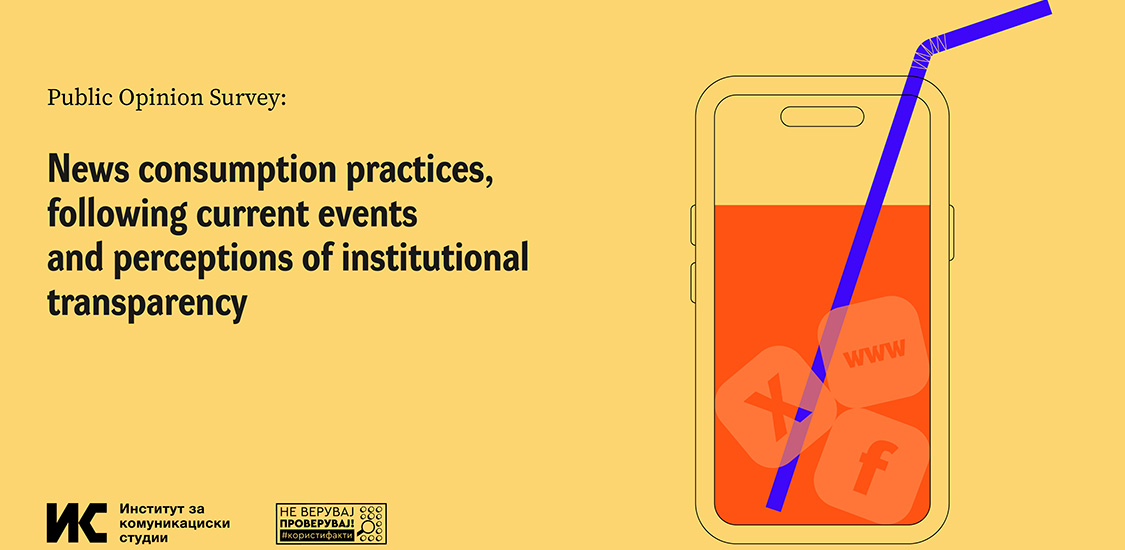
Survey: Low trust and discontent among citizens with the transparency and accountability of institutions
Citizens’ trust in institutions ranges from low to moderate, while there is no institution in the country that enjoys high level of trust.
Measured on a scale from 1 to 10, the Government (2.8), the Parliament (2.7), the political parties (2.5), the Public Prosecutor’s Office (2.5) and the courts (2.4) are institutions in which citizens have lowest confidence. The President of the country (3.5), the police (3.8) and the local self-government (3.7) enjoy moderate trust, and the institution with the highest level of trust is the Army (4.9).
The media (3.5) and non-governmental organisations (3.5) also have low to moderate trust, and international organisations and alliances, such as the United Nations (3.9), NATO (3.8) and the EU (3.5), and religious communities (4.4) enjoy moderate trust.
These are the results of the public opinion survey: “News consumption practices, following current events and perceptions of institutional transparency”, which the Institute of Communication Studies (ICS) conducted during October and November of this year. The survey examined citizens’ perceptions of their trust in institutions, transparency and accountability, as well as how citizens consume news and tackle possible disinformation.
What are the perceptions of the accountability of state authorities?
Almost two-thirds of the participants in the research (65.4%) do not think that the Government works openly and ethically, and a relatively high percentage (63.2%) do not agree that the Government respects the democratic institutions of the state. Almost half (44.2%) of the respondents consider that the Government frequently has excuses for officials who behave inappropriately.
Regarding the Parliament, less than 1% of all survey respondents believe that MPs always care about the citizens they represent, and 2.9% that MPs always bring laws and policies that are in the public interest. On the contrary, 58.4% of respondents believe that MPs never care about citizens, and 50.2% that they never pass laws and policies that are in the public interest.
When asked if they think that the Public Prosecutor’s Office regularly initiates proceedings after there are publicly stated allegations for misdoings, more than two-thirds of the citizens expressed disagreement (72.5%), and almost 40% do not agree at all that the charges brought by the prosecutor’s office regularly receive a court resolution. As high as 70% of respondents consider that the public is not informed about the course of court proceedings.
What is the communication of state institutions with the public like?
Citizen contentment with the regularity, accessibility, clarity and intelligibility of information from state institutions is also low. A very low percentage of respondents consider that public institutions regularly share information (3.2%), and the information they share is accessible (3.7%), clear (3.5%) and understandable (4.1%).
Asked about current events in the past period, a high percentage of citizens answered that the state institutions share little or no information about the constitutional amendments (64%), the amendments to the Criminal Code (64.8%), the agreement between the Government and the Bechtel-Enka company for construction of highways (65.6%) and the concession of mines in the Strumica region (60.3%).
More than two-thirds of respondents consider that the communication of state institutions has deteriorated in terms of being based on facts (37%) or has not changed compared to recent years (42.5%).
How do citizens consume news?
More than half of the survey respondents (55.6%) state that they doubt everything that is published in the media. Despite the significant doubt, more than a third of the respondents (36.6%) do not check the producer/news publisher, and more than half never check if the news has a signed author (43.2%). Citizens more frequently check how other media report the news (42.2%) and consult with people they consider knowledgeable on the subject (43.9%). Although two thirds of survey respondents (67.1%) say they can spot disinformation, a significant 41% said they have sometimes shared news that later turned out to be false.
According to the survey, television (66.2%) and social media (57.3%) are the main source of information for citizens. A significantly lower percentage of respondents get information from online news aggregates such as Time.mk (19.7%) and websites (20%). Slightly more than 10% get their information from friends and acquaintances, while newspapers (6.4%) and radio (5.8%) are the source of information for the lowest percentage of respondents.
The telephone survey was conducted by the Institute for Democracy “Societas Civilis” on a representative sample of 1000 respondents – citizens of the Republic of North Macedonia over the age of 18, from all regions of the country, in the period from 20 October to 14 November, 2023.
The public opinion survey is part of the Use Facts project, which the Institute of Communication Studies (ICS) is implementing with the support of the British Embassy Skopje.

